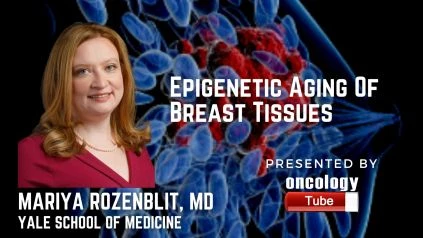Mariya Rozenblit, MD, Instructor of Medicine (Medical Oncology) and cares for patients with a clinical focus on breast cancer from Yale School of Medicine. In this video, she speaks about the abstract Evidence of accelerated epigenetic aging of breast tissues in patients with breast cancer is driven by CpGs associated with polycomb-related genes.
Â
Abstract
Goal:
Age is one of the most significant risk factors for the development of breast cancer; nevertheless, the underlying etiology between age and breast cancer remains unknown. We previously discovered correlations between epigenetic aging signatures in breast/tumor tissue and breast cancer risk/prevalence. However, these DNA methylation-based aging biomarkers capture a wide range of epigenetic events, and it is unknown to what extent they are related to breast cancer risk and/or development.
Â
Methodologies:
We used six epigenetic clocks to see if they could tell the difference between normal breast tissue close to a tumor (cases) and normal breast tissue from healthy controls (controls).
Â
Findings:
The Levine (p = 0.0037) and Yang clocks (p = 0.023) revealed significant epigenetic age acceleration in patients versus controls in breast tissue. We discovered that CpGs associated with polycomb-related genes account for a significant portion of the variance between cases and controls. As a result, we created a new score that only included CpGs linked with polycomb-related genes and proved that it accurately reflected epigenetic age acceleration in patients vs controls (p = 0.00012). Finally, we looked to see if the same signal could be observed in peripheral blood. We found no difference between patients and controls, and no correlation between matched tissue/blood samples, implying that peripheral blood is not a good surrogate measure for epigenetic age acceleration.
Â
Observations:
Moving forward, studies will be needed to determine whether epigenetic age acceleration in breast tissue precedes breast cancer diagnosis and whether methylation changes at CpGs associated with polycomb-related genes can be used to predict the risk of developing breast cancer in unaffected individuals.

